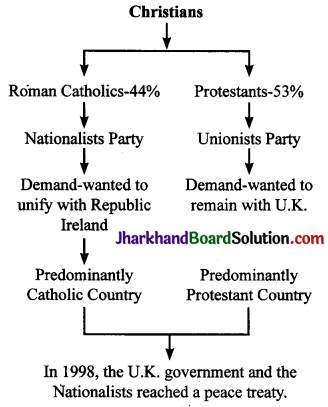JAC Board Class 10th Social Science Important Questions Civics Chapter 3 Democracy and Diversity
Multiple Choice Questions
Question 1.
Why did Tommie Smith and John Carlos wear black socks and no shoes at the 1968 Olympics held at Mexico City?
(a) To represent Black power
(b) To represent Black poverty
(c) To represent the Civil Rights Movement in the USA
(d) To represent International Olympic Association
Answer:
(b) To represent Black poverty
Question 2.
What did the gesture of wearing black socks and no shoes by Tommie Smith and John Carlos try to draw the attention to?
(a) 1968 Olympics held at Mexico City
(b) Diversity of the United States of America
(c) Migrant community of the USA
(d) Racial discrimination in the United States
Answer:
(d) Racial discrimination in the United States
![]()
Question 3.
Why were the Olympic medals of Tommie Smith and John Carlos taken back?
(a) For violating the Olympic spirit by making a political statement
(b) For participating in 1968 Olympics held at Mexico City
(c) For participating in Civil Rights Movement in the USA
(d) For representing the American Civil War
Answer:
(a) For violating the Olympic spirit by making a political statement
Question 4.
What were the athletes, such as Tommie Smith, John Carios and Peter Norman responding to in 1968 Olympics at Mexico City?
(a) Olympics at Mexico
(b) Civil Rights Movement in the USA
(c) Social divisions and social inequalities
(d) The Black Power Movement
Answer:
(c) Social divisions and social inequalities
Question 5.
Who led the Civil Rights Movement in the USA?
(a) Rosa Parks
(b) Nelson Mandela
(c) Abraham Lincoln
(d) Martin Luther King Jr.
Answer:
(d) Martin Luther King Jr.
![]()
Question 6.
What was the duration of Black Power Movement?
(a) 1696 to 1795
(b) 1965 to 1976
(c) 1966 to 1975
(d) 1669 to 1759
Answer:
(c) 1966 to 1975
Question 7.
What are social differences mostly based on?
(a) Belonging to a homogeneous group
(b) Accident of birth
(c) Accident of death
(d) Belonging to the same religion
Answer:
(b) Accident of birth
Question 8.
The region of United Kingdom has been for many years the site of what type of conflict?
(a) Ethrio-political
(b) Religious
(c) Political
(d) Linguistic divisions
Answer:
(a) Ethrio – political
Question 9.
In which year did the UK government and the Nationalists reach a peace treaty?
(a) 1898
(b) 1997
(c) 1998
(d) 1999
Answer:
(c) 1998
Question 10.
Political competition along religious ending ethnic lines led to the disintegration of which country into six independent countries?
(a) Serbia
(b) Yugoslavia
(c) Hungary
(d) Romania
Answer:
(b) Yugoslavia
Very Short Answer Type Questions
Question 1.
What do you mean by Apartheid?
Answer:
Apartheid was a policy of racial discrimination followed by the White regime against the Blacks in South Africa.
Question 2.
What is Civil Rights Movement?
Answer:
Civil Rights Movement in the USA (1954-1968) refers to a set of events and reform movements aimed at abolishing legal racial discrimination against African- Americans. Led by Martin Luther King Jr., this movement practised non-violent methods of civil disobedience against racially discriminatory laws and practices.
Question 3.
Who were Afro – Americans?
Answer:
Afro – American, Black American and Blacks are the terms used to refer mainly to the descendants of Africans who were brought into America as slaves between 17th century and early 19th century.
Question 4.
What is Black Power?
Answer:
The Black Power movement emerged in 1966 and lasted till 1975, It was a more militant anti-racist movement, advocating even violence if necessary to end racism in the US.
![]()
Question 5.
What is Homogeneous society?
Answer:
It is a society that has similar kind of people, especially where there are no significant ethnic differences.
Question 6.
Who are called Migrants?
Answer:
Migrant is anybody who shifts from one region or country to another region within a country or to another country, usually for work or other economic opportunities.
Question 7.
Mention one impact of Migration.
Answer:
Migration turns a homogeneous country into a multi-cultural country.
Question 8.
Who led the Civil Rights Movement in USA?
Answer:
Martin Luther King (Junior).
Question 9.
When do overlapping differences happen?
Answer:
Overlapping differences happen when one kind of social difference becomes more important than the other and people start feeling that they belong to different communities.
![]()
Question 10.
Give one positive way in which social divisions affect politics.
Answer:
This allows various disadvantaged and marginal social groups to express their grievances and get the government to attend to these.
